Table of Contents
Do I need a Privacy Policy for Google AdSense?
A Google-friendly Privacy Policy is required to get approved for a Google AdSense account on your blog or website. Website owners and publishers must recognize the importance of a thorough privacy policy. This becomes particularly important when utilizing advertising networks like Google AdSense.
As an ad network, Google AdSense gathers different data from users engaging with website ads. This includes but is not limited to, cookies, IP addresses, device information, and browsing behavior. To adhere to legal obligations and offer users transparency, website owners must have a clear and concise privacy policy that delineates the collection, usage, storage, and protection of this data.
A well-crafted privacy policy demonstrates your commitment to protecting user information and helps build trust with your audience. It assures them that their data will be handled responsibly and under applicable laws and regulations.
Developing a privacy policy that addresses Google AdSense is essential for website owners. This policy ensures compliance with data protection regulations and maintains transparency for users. This guide aims to underscore the significance of a privacy policy specifically designed for Google AdSense. I will show you how to create a Google-friendly Privacy in 12 easy steps!
What is the Privacy Policy in Google Ads?
In its Google Ads Controller-Controller Data Protection Terms, Google meticulously outlines and establishes the terms that govern the careful handling and robust protection of your valuable data. By implementing these comprehensive measures, Google ensures that your personal information is treated with the utmost confidentiality and security, providing peace of mind when utilizing its advertising services.
As an advertising platform, Google AdSense collects data to deliver relevant ads to users. This data may include browsing history, device information, and demographic details. The Privacy Policy ensures that this data is handled responsibly and complies with applicable privacy laws.
Google Adsense tracking enables advertisers to reach their target audience effectively by utilizing user preferences and interests. However, it is important to note that this tracking is done anonymously and does not personally identify individuals.
The Privacy Policy also provides insights into how user information is used for personalized advertising. This includes tailoring ads based on browsing behavior or demographics to enhance the overall ad experience for users. Propman Guides outlines what we collect in our Privacy Policy and Cookies Policy.
The Privacy Policy of Google Ads underscores the significance of safeguarding user privacy while allowing personalized advertising. It ensures responsible collection and utilization of user information in compliance with legal obligations.
How do I write a Privacy Policy for Google AdSense?
When creating a Privacy Policy for Google AdSense, it is important to consider key elements and address specific considerations. This document plays a vital role in ensuring compliance with privacy regulations and provides users with an understanding of how their data is collected, used, and shared.
Google runs its checks to ensure you incorporate specific sections in a Privacy Policy on a website when you request approval for AdSense. To get approved, each section should explicitly address collecting different types of information, including personal data and cookies. It is important to outline how this collected information is utilized for ad personalization purposes. Additionally, transparency regarding data sharing with third parties, such as advertisers or partners, should be provided. Clear explanations about cookie usage are vital, including their role in tracking and targeting ads. Options for managing or turning off cookies should be presented to users.
To create a Privacy Policy compatible with Google AdSense and adhere to relevant regulations, it can be beneficial to reference examples tailored explicitly for AdSense. These examples can assist in crafting the structure of your document while maintaining compliance. In the following section, I will outline the process of creating a Google-friendly Privacy Policy, which will enhance your likelihood of obtaining approval for a Google AdSense account.
Avoiding Common Mistakes and Legal Issues in Your Google AdSense Privacy Policy
To ensure legal compliance and prevent potential issues with Google AdSense, it is crucial to prioritize the accuracy and transparency of your privacy policy. This section will outline common mistakes that advertisers often make in their privacy policies and offer guidance on avoiding them.
Be cautious when using a free privacy policy generator for Google AdSense. Often, free generators fail to meet requirements and adhere to regulations required for a Privacy Policy for Google AdSense. One of the most common mistakes is failing to accurately disclose the types of information collected from users through Google AdSense. It is essential to clearly state what personal data is being collected, such as IP addresses or cookies, and how it will be used.
Another mistake to avoid is using vague or confusing language in your privacy policy. It is essential to use precise, concise wording that users can easily understand. Ambiguity can lead to misunderstandings or even legal complications.
Transparency holds the utmost importance in privacy policies. Providing detailed information regarding storing, protecting, and sharing user data with third parties is essential. Additionally, it is crucial to communicate the purpose of collecting user data and highlight users’ options concerning their personal information.
Keeping your privacy policy up to date is vital for compliance with the law. As regulations evolve, staying informed and making necessary policy changes is crucial.
To maintain trust and comply with legal obligations, avoiding common mistakes and ensuring accuracy and transparency in your Google AdSense privacy policy is crucial. This will help you establish a trustworthy relationship with your users.
How do I create a Google-friendly Privacy Policy?
A Google-friendly Privacy Policy is ideal for websites and blogs using Google AdSense and Google Analytics. It guarantees adherence to Google’s policies and fosters trust among your audience. When creating your privacy policy, it is essential to utilize clear language and make it easily understandable for readers. We covered how to use the TermsFeeds policy generator and showed you how to create a free privacy policy for your website. We will follow the same process, but this time, we will only show you the features and benefits of the premium options in this guide. Before you start, I highly recommend you check out the step-by-step guide to enhance your free template.

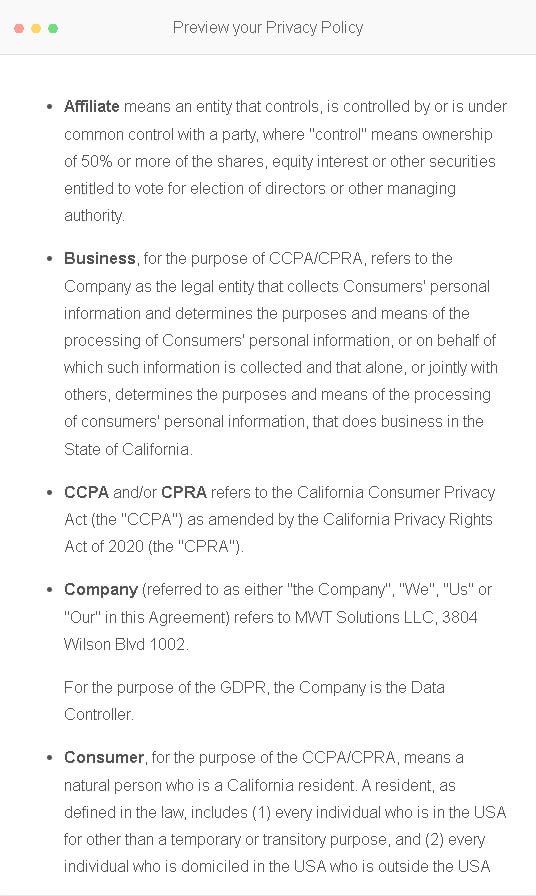
Create a Privacy Policy for Google AdSense in 12 Easy Steps
Step 1: Premium-Only Provisions
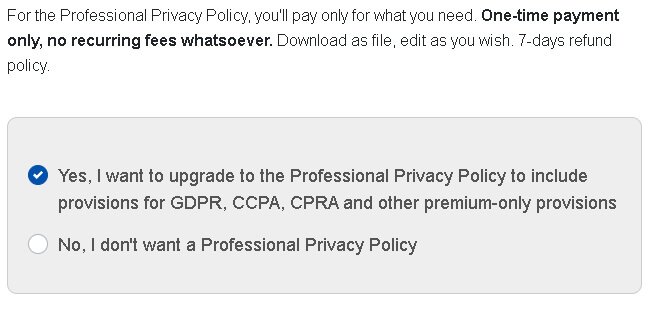
Select “Yes, I want to upgrade to the Professional Privacy Policy to include provisions for GDPR, CCPA, CPRA and other premium-only provisions” to enable the premium options.
Step 2: Tracking / Analytic Tools
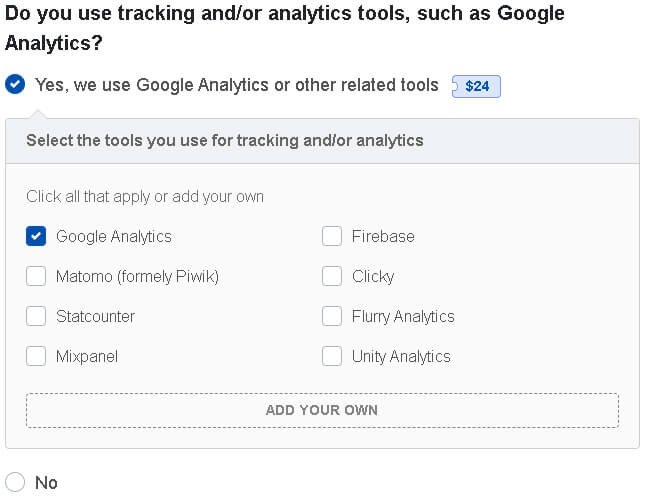
Select “Yes, we use Google Analytics or other related tools” and select the applicable tools.
Step 3: Emailing List

Select the applicable option. In the example, I checked no because it does not apply. However, if you email users, select Yes.
Step 4: Ad Services

Select the applicable option. In the example, I checked Yes because we show ads on the site.
Step 5: Products or Services

If your blog or website offers products and services, select “Yes, users can pay for our products/services” and select the applicable payment methods, for example, PayPal.
Step 6: Remarketing Services
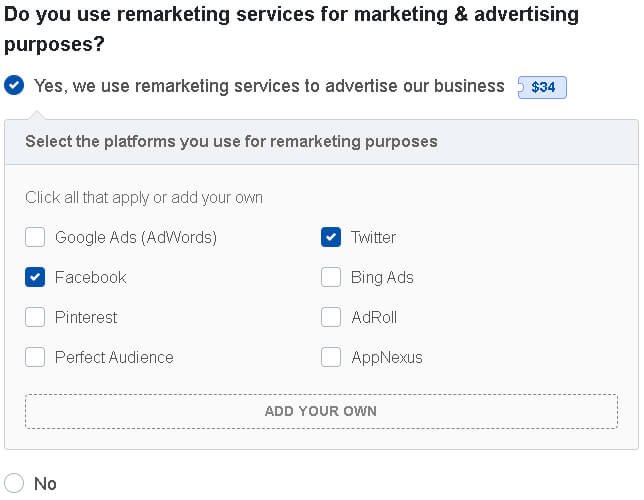
If you use remarketing services such as Google Ads, Facebook, or Bing, select “Yes, we use remarking services to advertise our business” and select the applicable platform.
Step 7: Third-Party Service Providers
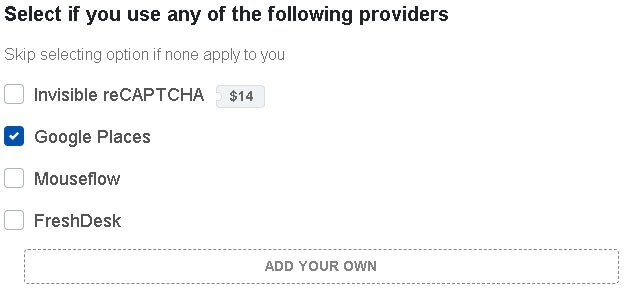
I skip this step because it does not and should not impact your approval for Google AdSense. However, if it applies to you, please select the applicable option.
Step 8: CCPA + CPRA

Select “Yes. Adapt my Privacy Policy to include CCPA + CPRA wording,” and TermsFeed will include language for websites, applications, and businesses located in the US.
Step 9: GDPR
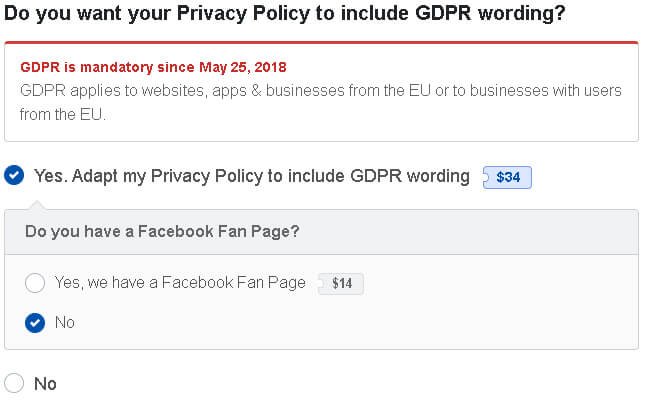
Select “Yes. Adapt my Privacy Policy to include GDPR working” and No if you do not maintain a Facebook Fan Page.
Step 10: CalOPPA
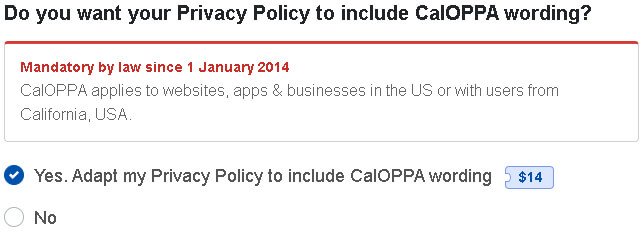
Select “Yes. Adapt my Privacy Policy to include CalOPPA wording” and continue.
Step 11: COPPA
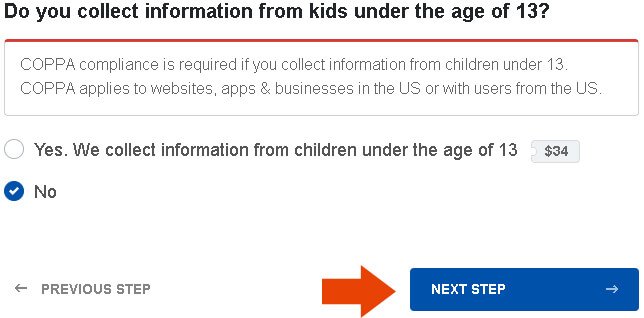
Select the applicable option. I checked Yes in the example because we do not collect from kids under 13, and click NEXT STEP to continue.
Step 12: Generate Privacy Policy
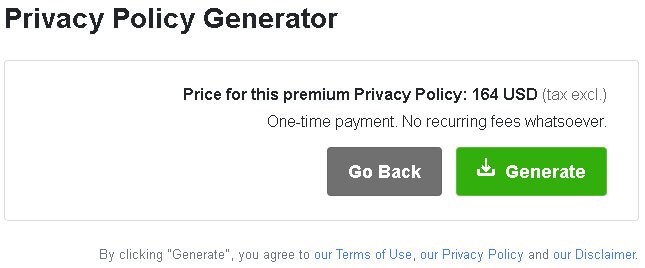
Say Hello to Your Google-friendly Privacy Policy!
TermsFeed Download Options

Upload your new Privacy Policy to your blog or website, or let TermsFeed host it for free, and that is it!
Estimated Cost: 164 USD
Remember that a well-crafted privacy policy satisfies Google’s requirements and demonstrates respect for user privacy. By using clear language and making it reader-friendly, you can create a Google-friendly Privacy Policy that effectively communicates your commitment to protecting user information while maintaining transparency in data handling practices.
An Example of a Well-Crafted Privacy Policy for Google AdSense to Get You Started
To comply with privacy regulations and ensure transparency, website owners must have a well-crafted privacy policy, especially when using Google AdSense. To assist you in creating an effective privacy policy for your website, we have provided a sample template below:
[Your Website Name] Privacy Policy Effective Date: [Date] Introduction: At [Your Website Name], we value the privacy of our users and are committed to protecting their personal information. This Privacy Policy outlines how we collect, use, disclose, and safeguard the information provided by our users. Information We Collect: - Personal Information: We may collect certain personally identifiable information (such as name, email address, and contact details) from our users when they voluntarily provide it to us. - Non-Personal Information: We may also collect non-personal information (such as browser type, operating system, and IP address) through the use of cookies or similar technologies. Use of Collected Information: The information collected from our users is used for the following purposes: - To personalize user experience - To improve our website - To send periodic emails - To display relevant advertisements through Google AdSense Disclosure of Collected Information: We may share certain personal or non-personal information with third-party service providers who assist us in operating our website or conducting business activities on our behalf. However, we do not sell or rent any personal information to third parties. Google AdSense: Our website uses Google AdSense to display targeted advertisements. As such, Google may collect certain anonymous data about your visit through cookies or similar technologies. You can learn more about how Google collects and uses this data by visiting their Privacy Policy page. Third Party Links: Our website may contain links to third-party websites that are not controlled or operated by us. We are not responsible for the privacy practices or content of these websites. We encourage you to review the privacy policies of any third-party websites you visit. Security Measures: We implement industry-standard security measures to protect the information provided by our users. However, please note that no method of transmission over the internet or electronic storage is 100% secure. Changes to this Privacy Policy: We reserve the right to modify or update this Privacy Policy at any time. Any changes will be effective upon posting on our website. We encourage our users to review this Privacy Policy periodically for any updates. Contact Us: If you have any questions or concerns regarding this Privacy Policy, please contact us at [Your Contact Information]. By using our website, you hereby consent to the terms of this Privacy Policy and agree to its provisions.
Please note that this sample privacy policy should be customized according to your requirements and legal obligations. It is recommended to seek professional advice when drafting your privacy policy.
Conclusion
A well-crafted privacy policy for Google AdSense is essential to promote transparency and establish user trust. It communicates how user data is collected, utilized, and safeguarded, fostering accountability and reliability.
A privacy policy plays a crucial role in building trust with users. Ensuring individuals that their personal information is handled responsibly and in compliance with legal obligations encourages them to interact more freely with online platforms and services.
A comprehensive privacy policy showcases an organization’s dedication to safeguarding data privacy. It outlines the steps to protect sensitive information and assures users that their data will not be misused or shared without consent.
A well-crafted privacy policy addresses data collection, cookie usage, third-party disclosures, and opt-out options. It fulfills legal requirements and promotes transparent communication between businesses and users.
Creating a well-defined and concise privacy policy for Google AdSense has several advantages. It helps build user confidence, ensures compliance with legal requirements, and safeguards data privacy. Investing time and effort in this endeavor can yield substantial benefits.





















I do not know if it’s just me or if perhaps everyone else experiencing problems with your
blog. It appears like some of the text within your posts
are running off the screen. Can somebody else please comment
and let me know if this is happening to them too?
This may be a issue with my browser because I’ve had
this happen before. Thank you
There’s definately a lot to learn about this topic.
I love all of the points you’ve made.